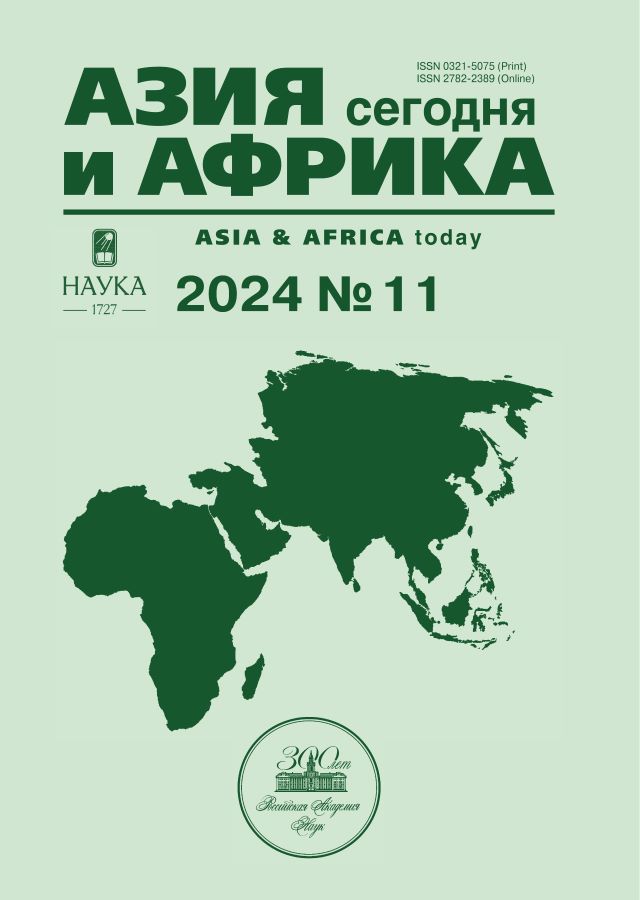№ 11 (2024)
Politics, economics
India in the Global Microelectronics Market
Аннотация
The Indian government attaches high importance to the development of microelectronics industry in order to achieve the goals of Self-reliant India Campaign (Atmanirbhar Bharat Abhiyan) announced in May 2020. The main objectives of special programs and measures are to give an impetus to the domestic manufacturing sector, attract investments, and generate direct and indirect employment. The BJP government’s vision for electronics industry is focused on expanding production facilities to meet local demand and ramp up exports. It is important to note the impact of external/global factors as well. In searching for alternative options to China, large electronic companies are considering the possibility of transferring manufacturing operations to India, noting such country’s advantages like the fastest economic growth, large workforce, rapidly expanding middle class and stable political system. Step by step India keens to become a prominent player in the global microelectronics market. The article analyzes the key stages of the development of electronics industry in India, explores taken by the current central government efforts to promote electronics system design and IT hardware manufacturing in the country.
 5-13
5-13


North Korea’s Nuclear Missile Potential Issue in Japanese Policy: Trends and Prospects
Аннотация
 14-22
14-22


Gabon: The 2023 Coup in the Context of Postcolonial History
Аннотация
 23-30
23-30


Water of the Nile. Present. Past. Future
Аннотация
 31-39
31-39


Modern Perception of Water Scarcity Issue in African Countries
Аннотация
 40-48
40-48


BRICS today
Economic and Political Aspects of Egypt’s Accession to BRICS
Аннотация
 49-56
49-56


Political portrait
Abul Kalam Azad and Ethno-Confessional Nationalism: Political Activity and Religious and Philosophical Quest
Аннотация
The purpose of the article is to analyze the political activities and religious and philosophical views of an outstanding figure of the Indian national movement, one of the leaders of the influential Indian National Congress Party, its president during World War II, a staunch Muslim Abul Kalam Azad (1888-1958) in the context of the problem of ethnic and confessional nationalism in India. Azad was an implacable fighter for the unity of India and an opponent of its partition. Together with Jawaharlal Nehru, he was the creator of the theory of Indian nationalism the entire population of Hindustan is one people. Azad believed that large political associations (states) were the most progressive, and humanity, sooner or later, would come to realize its unity. He believed that there were more similarities than differences in different religions, and considered Islam to be a religion of freedom. Using Indian and domestic sources and research, the author characterizes one of the least studied Indian politicians and thinkers in our country, an associate of Mahatma Gandhi, an opponent of the disintegration of the country along religious and confessional lines in 1947.
 57-63
57-63


Foreign expert view
Islamic Populism and Its Effects on Social Capital and Democracy: Evidence from Indonesian Presidential Elections
Аннотация
This study examines the profound influence of Islamic populism on the 2019 Indonesian presidential election and its influence on the 2024 election. It analyzes how the main candidates, Joko Widodo and Prabowo Subianto, utilized religious sentiments in their campaign strategies. By the time of 2024 presidential election, it highlights the emerging strategies presidential candidates adopted to attract voters. Successful candidates garnered substantial support from the previous supporters of President Joko Widodo, convincing them to shift their allegiance. By employing a strategy that resonates with the majority and boosts a candidate’s visibility and appeal, candidates increase their likelihood of winning. The study relies on academic literature and election result data to parse regional voting patterns and their implications for Indonesia’s political landscape. Indonesian presidential elections in 2024 demonstrated a discernible shift towards candidates who blend Islamic values with pluralism. The study concludes that aligning with the incumbent president’s network has significant influence on electoral success. This strategy significantly strengthens a candidate’s appeal to voters.
 64-70
64-70


Post-graduate tribune
The Port and Logistics Dimension of the UAE’s Strategy in Africa
Аннотация
 71-79
71-79


Culture, literature, art
African Episodes on Russian and Bengali Literary Scenes
Аннотация
 80-84
80-84











